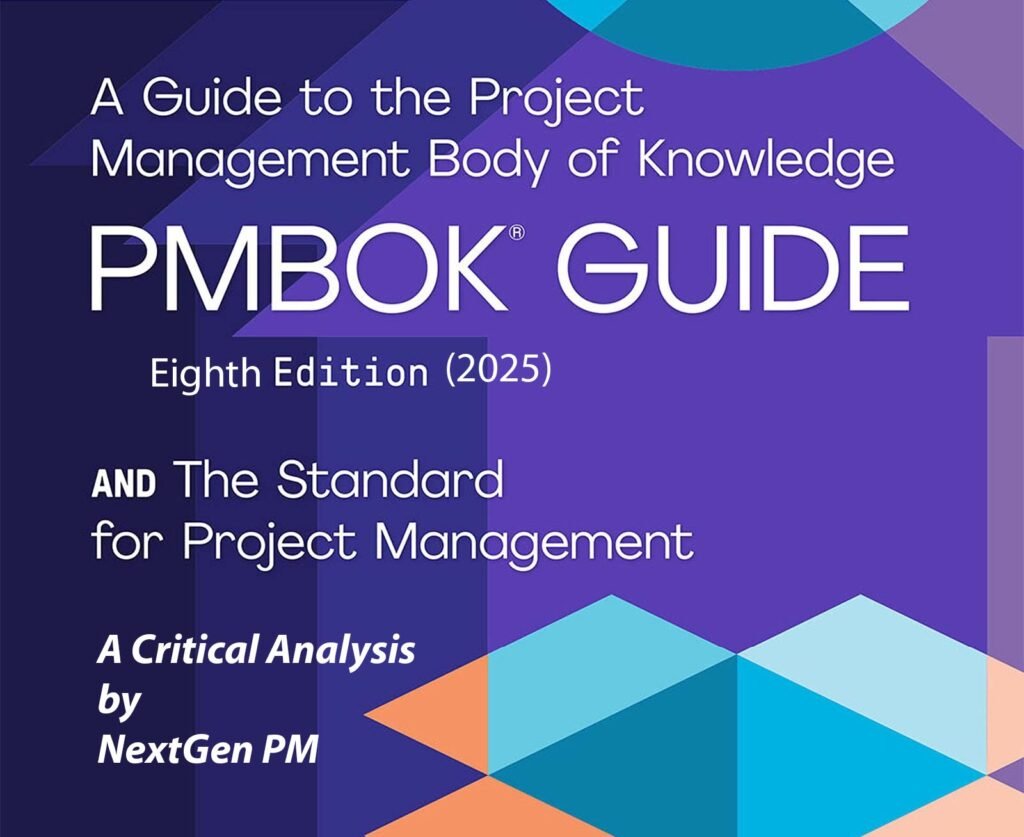The PMBOK® Guide Eighth Edition, in its draft form, reflects an important milestone in the ongoing evolution of project management practices. However, as project environments grow increasingly complex, this guide—like its predecessors—requires scrutiny to ensure it meets the needs of practitioners across industries and organizational sizes. At NextGen PM, we approach this critique from the perspective of a platform dedicated to the future of project management, particularly focusing on AI integration, sustainability, and human-centered AI collaboration.
Persistent Gaps and NextGen PM’s Perspective
1. Artificial Intelligence: Beyond Automation
The PMBOK® Guide draft mentions AI but misses the opportunity to explore its transformative potential in depth. At NextGen PM, we emphasize the integration of AI not just as an automation tool but as a collaborative partner:
- Human-AI Interaction: AI should augment decision-making by providing real-time insights that empower project teams to focus on strategic tasks. For example, AI can prioritize tasks dynamically based on team capabilities and project demands.
- Generative AI in Planning and Communication: Advanced models like GPT can support drafting project charters, stakeholder updates, and progress reports with accuracy and minimal bias.
- Proactive Risk Assessment: Machine learning models can analyze historical data to predict project risks and recommend mitigations before issues arise.
These integrations allow AI to transition from being a supportive technology to becoming an indispensable part of the project management ecosystem.
2. Sustainability Metrics: From Theory to Practice
While the PMBOK® Guide highlights sustainability, actionable frameworks remain underdeveloped. Sustainability in projects should go beyond mere acknowledgment to measurable, impactful practices:
- Carbon-Neutral Workflows: Encouraging the use of digital platforms and remote work models to reduce carbon footprints.
- ESG-Integrated KPIs: Establishing clear metrics to evaluate environmental, social, and governance outcomes as part of project success.
- Lifecycle Sustainability: Incorporating sustainability at every phase—from initiation to closure—to ensure long-term value creation.
At NextGen PM, we are developing dashboards that not only track such metrics but provide actionable insights to align projects with organizational sustainability goals.
3. Distributed Teams and Collaborative Networks
Modern project management is increasingly defined by distributed teams and inter-organizational collaborations. The PMBOK® Guide offers limited solutions for these scenarios:
- Building Cohesion in Virtual Teams: Tools for fostering trust and cohesion through virtual icebreakers, shared goals, and consistent communication rituals.
- Enhanced Asynchronous Collaboration: Guidelines for leveraging tools like project management software to streamline workflows across time zones.
- Scalable Collaboration Frameworks: Structured approaches for managing dependencies and ensuring accountability in multi-organization projects.
NextGen PM’s focus includes practical training modules and AI-enhanced tools tailored for the needs of distributed teams, ensuring productivity without sacrificing flexibility.
4. Crisis Response: Dynamic and Adaptive
Modern projects face unprecedented challenges—from global pandemics to economic instability. Crisis management in the PMBOK® Guide requires more depth to remain relevant:
- Real-Time Decision Frameworks: Systems that enable rapid adaptation to evolving crises through scenario-based planning.
- Stakeholder Communication During Crises: Emphasizing transparency and empathy to maintain trust and alignment during disruptions.
- Resilience Metrics: Incorporating resilience as a measurable aspect of project success to prepare for long-term uncertainties.
By integrating these approaches, project managers can not only navigate crises but emerge stronger and more aligned with stakeholder expectations.
NextGen PM’s Future-Oriented Solutions
At NextGen PM, we bridge the gaps with innovative frameworks that prioritize AI and sustainability:
- Human-AI Collaboration Tools: Solutions that emphasize AI’s role in augmenting team capabilities rather than replacing them.
- Sustainability Dashboards: Interactive, real-time platforms for tracking ESG goals and making data-driven sustainability decisions.
- Global Team Collaboration Models: Resources and tools for fostering productivity and trust in distributed teams.
Our commitment is to equip project managers with the tools and frameworks needed to thrive in dynamic, tech-driven environments.
Call to Action: Shaping the Future Together
The PMBOK® Guide Eighth Edition draft is an opportunity to redefine project management standards for a rapidly changing world. At NextGen PM, we encourage practitioners to not only engage with PMI’s Draft Comment Period but to contribute innovative ideas that bridge the gap between traditional practices and future needs. Together, we can build a project management ecosystem that is adaptive, sustainable, and inclusive of groundbreaking technologies.



